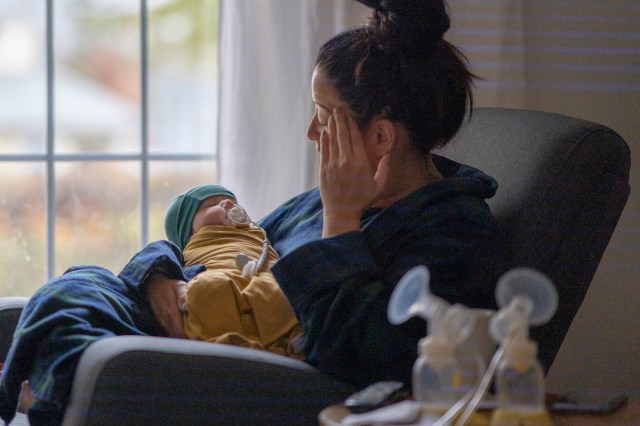A new study on unpaid financial leave shows just how devastating it is to be a new mom in the U.S.
Breeze, a disability and critical illness insurance company, conducted the recent study on unpaid family leave, surveying 1,001 women between the ages of 18 and 44. A reported 54% of those surveyed said they’d “consider a personal loan to cover unpaid maternity leave expenses,” while 49% would consider “drawing from their retirement funds.” Another 47% would take “a 5% pay cut if their employer offered paid maternity leave.”
Included in the study is the sobering fact that just 19% of U.S. workers have access to paid family leave through their employers at all. That means millions of women are faced with the choice of starting a family or continuing to earn money to live.
Regardless of how much you save in anticipation of being off work without pay, having to take weeks off to heal, care for a new baby, establish a routine, and feel emotionally or physically ready to be back in an office leaves most moms without any savings to speak of, if not in debt as a result. Add in any complications from birth, postpartum depression, lack of social or family support, and limited daycare options (most won’t accept an infant under six weeks of age), and the outlook becomes even more concerning for new parents.
Most of the women surveyed said taking unpaid leave would be a “permanent setback” to them financially, and 74% admit they wouldn’t have “any cash savings left after 8 weeks of unpaid maternity.” Over half (56%) would consider taking on an “uncomfortable amount of credit card debt” to cover expenses incurred from unpaid leave, only exacerbating financial instability for months and years to come.
It’s worth repeating that the U.S. is the only industrialized nation that does not require companies to issue paid family leave. As a result, one in four women go back to work just two weeks after giving birth, according to the advocacy group Paid Leave US (PL+US). Two weeks.
To underscore the importance of having this critical paid time off after having a child, 38% said they would work an extra ten hours a week to have that time covered and not deal with the overwhelming stress of such a financial burden. Given one study shows working moms actually “work” 98 hours a week, it’s anyone’s guess where this additional time can be found.
